Global War on Terror - Silver Star - Army
 The records below contain the Army recipients of the Silver Star during the Iraq and Afghanistan conflicts, collectively known as the Global War on Terror.
The records below contain the Army recipients of the Silver Star during the Iraq and Afghanistan conflicts, collectively known as the Global War on Terror.
* Indicates Killed in Action (KIA), Missing in Action (MIA), Prisoner of War (POW), or Died Non-Battle (DNB)
![]()
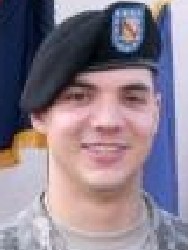

Citation:
The President of the United States of America, authorized by Act of Congress July 9, 1918 (amended by an act of July 25, 1963), takes pleasure in presenting the Silver Star to Private First Class Brendan T. Quinn, United States Army, for gallantry in connection with military operations against an opposing armed force while serving as a dismounted infantry scout in C Troop, 1st Squadron, 32d Cavalry Squadron (Air Assault Reconnaissance), 101st Airborne Division Multi-National Corps-Iraq, Baghdad, Iraq, on 16 January 2008 during OPERATION IRAQI FREEDOM. The gallant actions of Private First Class Brendan T. Quinn are in keeping with the finest traditions of military heroism and reflect marked distinction upon him, the Multi-National Corps-Iraq, the United States Army, and the Department of Defense. NARRATIVE TO ACCOMPANY AWARD: Private First Class Brendan T. Quinn, United States Army distinguished himself by exceptional gallantry in action against an enemy of the United States as a dismounted infantry scout in C Troop, 1st Squadron, 32d Cavalry Squadron (Air Assault Reconnaissance), Multi-National Corps-Iraq, Baghdad, Iraq, on 16 January 2008 during OPERATION IRAQI FREEDOM. Private First Class Quinn, part of an eight man team serving as the Aerial Reaction Force during a Squadron Air Assault, was inserted to interdict six unidentified personnel attempting to flee the objective area during the Squadron's initial Air Assault into Objective Hood, approximately 13 kilometers east of the city of Balad, Iraq. Aerial observers were unable to identify any weapons in possession of the six men that Private First Class Quinn's team landed to interdict. The six men took cover in a clump of brush in a barren field furrowed with irrigation ditches. Unknown to Private First Class Quinn's team, this brush was also a weapons cache containing six AK-47s, numerous loaded 30 round magazines and at least two fragmentation grenades. The Aerial Reaction Force Commander, First Lieutenant Hanson, ordered the men to surrender and move out from the brush. The men did not come forward. Believing them to be unarmed, the team moved forward to the brush to physically detain them. The team was engaged at close range with automatic weapons and fragmentation grenades. The fire was so intense that the individual weapons of three of the seven members of Private First Class Quinn's team were struck by small arms fire or grenade fragments. Private First Class Quinn and his teammate, Private First Class Kimme dropped to the prone position to return fire. Private First Class Kimme, at Private First Class Quinn's side, was struck in the head and fatally wounded immediately after dropping to the ground to return fire. The remaining five members of Private First Class Quinn's team, including the team leader, Staff Sergeant McGraw, were pinned down in the open field by heavy automatic weapons fire. Private First Class Quinn continued to engage the enemy by his fallen comrade's side, in the open, 10 meters from the enemy position, exposed to a heavy volume of automatic weapons fire and at least two fragmentation grenades. Staff Sergeant McGraw and Specialist Collins, both wounded, were able to break contact from the sustained fire. They moved to a position to the rear of Private First Class Quinn. Private First Class Quinn crawled back to their location, rendered first aid for the wounds and immediately crawled back into the fight by Private First Class Kimme's side, where he was once again engaged at a range of less than 15 meters by enemy automatic weapons fire. He stayed in position, continuing to engage the enemy until they were killed by a combination of his team's fires and door gun fires from the UH-60s supporting the mission. Private First Class Quinn's actions engaging the enemy at extremely close range, and attempting to render aid to Private First Class Kimme, while selflessly and repeatedly exposing himself to sustained close-range automatic weapons fire, were purely heroic in every sense of the word. The gallant actions of Private First Class Brendan T. Quinn are in keeping with the finest traditions of military heroism and reflect marked distinction upon him, the Multi-National Corps-Iraq, the United States Army, and the Department of Defense.
Home Town: Foxboro, Massachusetts


Citation:
The President of the United States takes pleasure in presenting the Silver Star Medal to Patrick M. Quinn, Master Sergeant, U.S. Army, for conspicuous gallantry and intrepidity in action while serving with Operational Detachment Alpha 065 (ODA-065), Company A, 2d Battalion, 10th Special Forces Group (Airborne), during combat operations in support of Operation IRAQI FREEDOM, on 5 April 2003, in Iraq, in engaging and destroying the Iraqi 96th Infantry Brigade, neutralizing the 4th and 16th Infantry Divisions, and routing a battalion of Saddam Fedayeen. Master Sergeant Quinn's performance was integral in the 2d Battalion, 10th Special Forces Group (Airborne) attack towards Mosul, Iraq. His actions under overwhelming odds and fierce resistance are a credit to him, the 10th Special Forces Group (Airborne) and the United States Army.
Home Town: Cromwell, Connecticut
QUINTANA, JUAN C.
Synopsis:
The President of the United States of America, authorized by Act of Congress July 9, 1918 (amended by an act of July 25, 1963), takes pleasure in presenting the Silver Star to Chief Warrant Officer Four (CW-4) Juan C. Quintana, United States Army, for conspicuous gallantry and intrepidity in action against the enemy in support of Operation ENDURING FREEDOM in Afghanistan. His gallant actions and dedicated devotion to duty, without regard for his own life, were in keeping with the highest traditions of military service and reflect great credit upon himself, his unit, and the United States Army.
RAPAPORT, DARREN A.
Synopsis:
The President of the United States of America, authorized by Act of Congress July 9, 1918 (amended by an act of July 25, 1963), takes pleasure in presenting the Silver Star to Captain Darren Alexis Rapaport, United States Army, for conspicuous gallantry and intrepidity in connection with military operations against an armed hostile force while serving with Company B, 1st Battalion, 69th Armored Regiment, 3d Infantry Division, in support of Operation IRAQI FREEDOM in the Battle for Baghdad, Iraq, in April 2003. Captain Rapaport fearlessly led his company through 100 kilometers of enemy defenses to a successful attack to capture a key crossing point over the Tigris River and complete the cordon of Baghdad west of the river. He led his company to success from the front and on the ground to show his regard for his soldiers. Captain Rapaport's gallant actions and dedicated devotion to duty, without regard for his own life, were in keeping with the highest traditions of military service and reflect great credit upon himself, the 3d Infantry Division, and the United States Army.
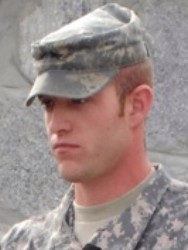

Citation:
The President of the United States of America, authorized by Act of Congress July 9, 1918 (amended by an act of July 25, 1963), takes pleasure in presenting the Silver Star to Sergeant Thomas C. Rasmussen, United States Army, for gallantry in action against an armed enemy while serving with Troop B, 3d Squadron, 61st Cavalry Regiment, 4th Brigade Combat Team, 4th Infantry Division, during a violent engagement with enemy forces at Combat Outpost KEATING on 3 October 2009, in support of Operation ENDURING FREEDOM in Afghanistan. Sergeant Rasmussen volunteered to assault the ammunition supply point and establish a stronghold at Combat Outpost KEATING after it was overrun by more than 400 anti-Afghan fighters. He was a critical member of the assault team that pushed to a battle position and recovered two American heroes. NARRATIVE TO ACCOMPANY AWARD: At 0600 on 3 October 2009, Combat Outpost KEATING, Kamdesh District, Nuristan Province, Afghanistan came under complex attack by an enemy force estimated at 400 fighters. The fighters occupied the high ground on all four sides of the COP and initiated the attack with concentrated fire from a B10 recoilless rifle, RPGs, DSHKAs, mortars, and small arms. Sergeant Thomas Rasmussen performed with uncommon valor while re-supplying battle positions with ammunition, providing critical support during early casualty evacuation, and serving on the assault element that secured COP KEATING. At initial contact, Sergeant Rasmussen pushed to an 1151 HMMWV (Truck) battle position. Once arriving on site, he began to link belts of .50 caliber ammunition to allow the gunner to continue to suppress enemy fighters on the high ground to the north. Throughout this process, Truck 1 was targeted and struck by enemy mortar rounds and small arms fire (SAF). Fully knowing the risk to himself, Sergeant Rasmussen climbed on top of the truck and assisted Private Faulkner with the weapon system. Almost immediately, an RPG struck the front of the vehicle and knocked Sergeant Rasmussen to the ground, but without hesitation he took up his previous position and continued to enable the gunner to engage. As the weapon began to run low on ammo, he maneuvered back to the barracks under heavy fire to secure additional ammunition. Arriving at the barracks, Sergeant Rasmussen linked up with Staff Sergeant Romesha and informed him of the situation. Noticing several shrapnel wounds to Staff Sergeant Romesha, Sergeant Rasmussen immediately began to give first aid, successfully applying a pressure dressing to Staff Sergeant Romesha that he would use the remainder of the day. Sergeant Hardt was sent to Truck 1 and replaced Sergeant Rasmussen. Sergeant Rasmussen was then assigned to be the point man for an assault team that was preparing to push out to reinforce positions. When Sergeant Rasmussen started to move out of the building, he was met by a wall of machine gun fire from a Taliban fighter who had succeeded in breaching the COP's perimeter and was on the COP. Sergeant Rasmussen responded by opening the door again, throwing hand grenades at the enemy fighter, and then systematically following with fire from his M4 and M203 rounds to clear the area of all enemy fighters. Once established in the building, Sergeant Rasmussen was critical in suppressing an enemy machine gun directly to the front of the ECP. Sergeant Rasmussen was also the point man for the assault team that maneuvered and retrieved the remains of two fallen Soldiers. With RPGs impacting in proximity to him, Sergeant Rasmussen and another Soldier set up a defensive position. He held that position while an aid and litter team moved to recover the remains of one Soldier. He then pushed further into the fray to locate and recover Staff Sergeant Gallegos' remains. Returning to the ECP building, Sergeant Rasmussen improved the defensive position there, working with Sergeant Larson to lay out concertina wire and claymore mines to better defend the stronghold. Holding and reinforcing the ECP was critical for all elements on COP KEATING, because it allowed friendly forces to secure the COP. Sergeant Rasmussen's valorous actions were a major contributing factor to the success of re-securing the COP. Sergeant Rasmussen displayed incredible valor throughout a tumultuous day. Knowing the grave danger he was routinely placing himself in while re-supplying battle positions and assaulting multiple enemy-held buildings, he proved his dedication to his fellow Soldiers.
Home Town: Mound, Minnesota
RAUEN, BRIAN R.
Synopsis:
The President of the United States of America, authorized by Act of Congress July 9, 1918 (amended by an act of July 25, 1963), takes pleasure in presenting the Silver Star to Captain Brian Robert Rauen, United States Army, for conspicuous gallantry and intrepidity in connection with military operations against an armed hostile force while serving in support of Operation IRAQI FREEDOM in Iraq. Captain Rauen's gallant actions and dedicated devotion to duty, without regard for his own life, were in keeping with the highest traditions of military service and reflect great credit upon himself, his unit, and the United States Army.


Citation:
The President of the United States takes pleasure in presenting the Silver Star Medal to Grant Ray, Sergeant, U.S. Army, for gallantry in action while serving as a Fire Support Team Chief with Troop G, 10th Cavalry, 1st Brigade Reconnaissance Troop, 4th Infantry Division, during combat operations in support of Operation IRAQI FREEDOM, on 18 - 19 September 2003. While on patrol in East Tikrit, Iraq, Sergeant Ray's patrol came under heavy enemy fire. Sergeant Ray immediately identified the ambush site and directed return fire. Despite being wounded he immediately jumped into the gunner's hatch and manned the mounted weapon after seeing his gunner collapse. After noticing that the trail vehicle had not cleared the ambush area, he ordered his vehicle back into the kill zone while he continued to fire the mounted weapon. Sergeant Ray's unselfish act to man the crew-served weapon, accurately direct return fire, and return to extract soldiers from enemy fire caused the enemy to break contact and ultimately saved the lives of soldiers in his patrol. Sergeant Ray's actions keep with the highest standards of selfless service and reflect great credit upon himself, the 4th Infantry Division, Combined Joint Task Force Seven, and the United States Army.
Personal Awards: Silver Star (War on Terrorism), Purple Heart
RAY, JONATHON
Synopsis:
The President of the United States takes pleasure in presenting the Silver Star Medal to Jonathon Ray, Sergeant First Class, U.S. Army, for conspicuous gallantry and intrepidity in action while serving with the 3d Battalion, 504th Parachute Infantry Regiment, 82d Airborne Division, during combat operations in support of Operation ENDURING FREEDOM, on 25 April 2003, in Afghanistan. Sergeant First Class Ray distinguished himself during combat operations as part of a quick reaction force trying to help American soldiers under attack along the Afghanistan-Pakistan border.
Home Town: Binghamton, New York
RAY, MARK D.
Synopsis:
The President of the United States of America, authorized by Act of Congress July 9, 1918 (amended by an act of July 25, 1963), takes pleasure in presenting the Silver Star to Captain Mark D. Ray, United States Army, for conspicuous gallantry and intrepidity in action against the enemy in support of Operation IRAQI FREEDOM in Iraq. His gallant actions and dedicated devotion to duty, without regard for his own life, were in keeping with the highest traditions of military service and reflect great credit upon himself, his unit, and the United States Army.
REAVER, MARK R.
Synopsis:
The President of the United States of America, authorized by Act of Congress July 9, 1918 (amended by an act of July 25, 1963), takes pleasure in presenting the Silver Star to Sergeant First Class Mark R. Reaver, United States Army, for conspicuous gallantry and intrepidity in action against the enemy in support of Operation IRAQI FREEDOM in Iraq. His gallant actions and dedicated devotion to duty, without regard for his own life, were in keeping with the highest traditions of military service and reflect great credit upon himself, his unit, and the United States Army.
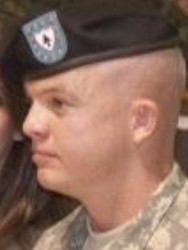

Citation:
The President of the United States of America, authorized by Act of Congress July 9, 1918 (amended by an act of July 25, 1963), takes pleasure in presenting the Silver Star to Sergeant Zachary R. Reese, United States Army, for gallantry in action on 11 April 2009, while serving as a Sniper Team Leader, 1st Battalion, 26th Infantry Regiment, 1st Infantry Division, in support of Operation ENDURING FREEDOM. Sergeant Reese was conducting a combat patrol with his element, when he spotted a large opposing force approaching. Without being spotted, he alerted the Platoon Leader in order to establish an ambush. When the ambush was initiated, Sergeant Reese's element was exposed to enemy fire, where he made sure his team stayed down, thereby avoiding any friendly fire casualties. He later participated in the ambush, destroying the opposing force. When checking the enemy casualties, an enemy fighter, feigning death, lunged and grabbed Sergeant Reese. In a terrifying moment of hand-to-hand combat, Sergeant Reese instinctively drew his knife from his vest and stabbed the man in his eye, killing him instantly. Sergeant Reese's actions are in keeping with the finest traditions of military service and reflect great credit upon himself, Combined Joint Task Force-101, and the United States Army.
REID, CURTIS A.
Citation:
The President of the United States of America, authorized by Act of Congress July 9, 1918 (amended by an act of July 25, 1963), takes pleasure in presenting the Silver Star to Staff Sergeant Curtis A. Reid, United States Army, for gallantry in action while performing his duties as the Bravo Section Leader for 1st Platoon, Baker Company, Task Force 1-15, ed Brigade, 3d Infantry Division on 3 July 2007. Staff Sergeant Reid's character, selfless service, and dedication to duty are directly responsible for the rescue of four American soldiers and one Iraqi Interpreter from a burning Bradley Fighting Vehicle. His actions are in keeping with the finest traditions of military service and reflect distinct credit upon himself, the "Audie Murphy" Company, the "Can Do" Battalion, the "Sledgehammer" Brigade, the "Marne" Division and the United States Army. NARRATIVE TO ACCOMPANY AWARD: Staff Sergeant Curtis A. Reid heroically distinguished himself by exceptionally valorous conduct in the face of enemy of the United States as the Bravo Section Leader in 1st Platoon, Baker Company, Task Force 1-15, 3d Brigade, 3d Infantry Division, on 3 July 2007 during Operation IRAQI FREEDOM V. Staff Sergeant Reid demonstrated heroism and valor as a Bradley Commander when he saved the lives of four American soldiers and one Iraqi Interpreter after an improvised explosive device struck his Bradley Fighting Vehicle. The strike immediately caused the Bradley to be engulfed in flames and left Staff Sergeant Reid with a severe concussion. In addition the gunner, Private First Class Jones, was unconscious and the three American soldiers and one Iraqi interpreter in the back of the Bradley also sustained head injuries. Staff Sergeant Reid immediately noticed that Private First Class Jones was unconscious from the blast, and started shaking him until the Soldier was conscious. Once awake, Private First Class Jones could not successfully get out of the turret by himself. As fire and smoke filled the turret and hull, Staff Sergeant Reid jumped on top of the turret and pulled Private First Class Jones out of the vehicle and handed him over to the medic on site. Due to the damage sustained on the vehicle, the driver was unable to lower the troop ramp, and the four individuals in the back were unable to open the troop door. The soldiers inside the vehicle managed to open the troop hatch; however, the main gun was oriented towards the rear of the Bradley hindering their escape. By this time the flames on the Bradley were fifteen feet high and smoke was billowing from the hull. Staff Sergeant Reid noticed that smoke had filled the troop compartment of the Bradley and that the Soldiers could not extract themselves. Without regard for his own safety, Staff Sergeant Reid got back inside the burning Bradley in order to manually raise the main gun. He successfully raised the main gun enabling the Soldiers in the back to push open the troop hatch wide enough to evacuate the vehicle. Staff Sergeant Reid then got out of the turret and maintained his position on top of the Bradley rescuing the four individuals one by one. Once Staff Sergeant Reid rescued the individuals that were inside his Bradley, he jumped off of the Bradley and started making his way out of the kill zone. After taking two steps away from the vehicle, he collapsed due to the extent of his own injuries. Minutes later he was evacuated by air to the 28th Combat Surgical Hospital for medical attention, where he was deemed in critical condition. Staff Sergeant Reid is directly responsible for saving the lives of four American Soldiers and one Iraqi interpreter. His decisiveness, leadership, and selflessness while injured and under enemy fire prove him worthy of respect and recognition. Staff Sergeant Reid's actions are in keeping with the finest traditions of military service and reflect distinct credit upon himself, the "Audie Murphy" Company, the "Can Do" Battalion, the "Sledgehammer" Brigade, the "Marne" Division and the United States Army.


Synopsis:
The President of the United States takes pleasure in presenting the Silver Star Medal to Larry Reis, First Sergeant, U.S. Army, for conspicuous gallantry and intrepidity in action while serving with the 1st Battalion, 3d Special Forces Group (Airborne), during combat operations in support of Operation ENDURING FREEDOM, on 10 and 11 October 2005, in Afghanistan. First Sergeant Reis was leading a combined Afghan national army patrol in Uruzgan Province in Afghanistan when he was attacked by about 150 insurgents in three locations. He relied on tactics that placed him between the enemy and his men in order to repel the numerically superior enemy force.


Citation:
The President of the United States takes pleasure in presenting the Silver Star Medal to Kevin K. Remington, First Sergeant, U.S. Army, for gallantry in action against enemy insurgent forces near Ar Ramadi, Iraq, while serving with the 957th Multi-Role Bridge Company, 142d Combat Heavy Engineer Battalion, 168th Engineer Group, during combat operations in support of Operation IRAQI FREEDOM, on 22 July 2003, in Iraq. First Sergeant Remington's actins displayed undaunted courage. He made the decision to put himself in harms way to save the life of a comrade. His training and skills are flawless. He simultaneously conducted a rescue mission, first aid, and engaging enemy fire from multiple locations all while planning the mission's next steps. His leadership is impeccable with the ability to inspire four soldiers in a gun truck to drive through an ambush kill zone four separate times to save their fallen comrades. First Sergeant Remington exemplifies the Army's values with his courage, generosity, and selfless service. First Sergeant Remington's humble demeanor is a reflection of a true "soldier's soldier". He brings extraordinary credit to the 957th Multi-Role Bridge Company, the 142d Combat Heavy Engineer Battalion, the North Dakota Army National Guard and the United States Army.
Home Town: Richardton, North Dakota


Synopsis:
The President of the United States takes pride in presenting the Silver Star Medal (Posthumously) to Mark T. Resh, Captain, U.S. Army, for conspicuous gallantry and intrepidity in action against the enemy while serving as Pilot of an AH-64D Longbow Apache Helicopter with the 4th Battalion, 227th Aviation Regiment, 1st Air Cavalry Brigade, 1st Cavalry Division, during combat operations in support of Operation IRAQI FREEDOM, on 28 January 2007, near An Najaf, Iraq. On that date, Captain Resh was dispatched to the city of An Najaf to assist and support coalition troops who had come in contact with enemy forces. Arriving support aircraft was attacked with heavy machine gun fire and rocket propelled grenades and Captain Resh placed his helicopter in the direct line of enemy fire so that another air crew that was under attack could maneuver out of danger. Over the next fifteen minutes he bravely flew in the face of intense enemy fire to support the coalition ground forces until his aircraft was struck and crashed, killing Captain Resh.
Home Town: Fogelsville, Pennsylvania
Personal Awards: Silver Star (War on Terrorism), Purple Heart
REYNOLDS, GABRIEL A.
Synopsis:
The President of the United States of America, authorized by Act of Congress July 9, 1918 (amended by an act of July 25, 1963), takes pleasure in presenting the Silver Star to Sergeant Gabriel A. Reynolds, United States Army, for exceptionally valorous conduct in the face of the enemy of the United States as a Network Administration Specialist in 2d Battalion, 3d Special Forces Group (Airborne), Special Operations Task Force - 33, Combined Joint Special Operations Task Force - Afghanistan, in support of Operation ENDURING FREEDOM on 10 November 2007. Voluntarily accompanying Special Forces members in combat operations, on this date Sergeant Reynolds left his machine gun to fire a 60-mm. mortar from a dangerous position, thereby saving his unit from a well-emplaced and heavily armed enemy positioned on the high ground. His actions are in keeping with the finest traditions of military heroism and reflect distinct credit upon himself, Special Operations Task Force - 33, the Combined Joint Special Operations Task Force - Afghanistan, Special Operations Command Central, and the United States Army.
Home Town: Lake Oswego, Oregon
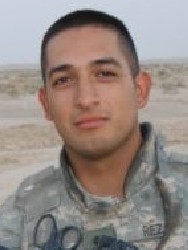

Citation:
The President of the United States of America, authorized by Act of Congress July 9, 1918 (amended by an act of July 25, 1963), takes pleasure in presenting the Silver Star to Sergeant Ivan Reza, United States Army, for conspicuous gallantry and intrepidity in action against the enemy while serving as a Medical Aidman with Company A, 1st Battalion, 6th Infantry Regiment, 1st Brigade Combat Team, 1st Armored Division, in support of Operation IRAQI FREEDOM in Iraq on 20 October 2006. Sergeant Reza moved in the line of enemy fire in disregard of his own safety to provide aid as a Combat Medic to a critically wounded soldier. Though wounded himself, Sergeant Reza refused aid and continued treating the wounded Soldier until he reached the Battalion Aid Station. His efforts helped to save the Soldier's life. His heroic actions during combat operations in Iraq contributed to the overwhelming success of the Command's mission, His bravery is in keeping with the finest traditions of military heroism and reflects distinct credit upon himself, the First Brigade Combat Team, the Multi-National Corps - Iraq, and the United States Army. NARRATIVE TO ACCOMPANY AWARD: Sergeant Ivan Reza heroically distinguished himself by exceptionally gallant conduct in the face of the enemy of the United States as a Combat Medic, Company A, 1st Battalion, 6th Infantry Regiment, Task Force 1-36, Hit, Iraq, on 20 October 2006 during Operation IRAQI FREEDOM. On 20 October 2006, Sergeant Reza was accompanying his section as the platoon medic. His section was tasked to monitor the local mosque message and was stationed along Route ASPEN in Hit, Iraq, in Al Anbar Province. After the message was complete, the section leader, Staff Sergeant Guillory, began movement back to the company CP. The Bradley Fighting Vehicles began to move when one of the Bradley's became disabled when the track came out of alignment with the sprocket. Staff Sergeant Guillory ordered the section to halt and began dismounting his squad to provide security while the crew conducted repairs. When the ramp was lowered the squad with Sergeant Reza moved out and assumed security positions around the vehicle. Corporal McNew, the vehicle gunner opened his turret shield door and began to dismount when the vehicle came under heavy machine gun and small arms fire directed into the back ramp of the vehicle. Corporal McNew was instantly hit in the leg and abdomen. Staff Sergeant Guillory pulled Corporal McNew into the turret and called for medic support. Sergeant Reza, with complete disregard for his own safety, moved into the line of fire and in the back ramp. He was immediately hit with a gunshot wound to the abdomen that would be later classified as "urgent surgical." Disregarding his own wounds, he helped Staff Sergeant Guillory pull Corporal McNew back into the crew compartment as the ramp was being raised. Inside the vehicle, he then began immediate lifesaving techniques to stabilize Corporal McNew. Staff Sergeant Gui9llory called for medical evacuation support and the company ambulance arrived to assist. Still under fire, the ambulance moved to the back of the Bradley and both vehicles lowered their ramps. Sergeant Guillory helped move Corporal McNew into the back of the ambulance. Still refusing medical attention, Sergeant Reza continued to help stabilize Corporal McNew while the ambulance moved back towards the Battalion Aid Station. Once at the Aid Station, Sergeant Reza then allowed medics and the doctor to give him medical aid for his own wounds. The Battalion Surgeon immediately recognized the seriousness of Sergeant Reza's wounds and began stabilizing him for medical evacuation to Al Asad and immediate surgery. Sergeant Reza was subsequently evacuated to Walter Reed Army Medical Center for further treatment and recovery. Sergeant Reza's heroism under intense enemy fire was directly responsible for saving the life of a critically injured Soldier. Disregarding the danger and despite his own wounds, he administered critical care to a fellow Soldier wounded in action. His actions are in keeping with the finest traditions of military heroism and reflect great credit upon himself, the Ready First Combat Team, the Multi-National Corps - Iraq, and the United States Army.
Home Town: Chicago, Illinois
RHODES, RANDY T.
Synopsis:
The President of the United States of America, authorized by Act of Congress July 9, 1918 (amended by an act of July 25, 1963), takes pleasure in presenting the Silver Star to Master Sergeant Randy T. Rhodes, United States Army, for conspicuous gallantry and intrepidity in connection with military operations against an armed hostile force while serving in Operational Detachment Alpha 325 (ODA-325), in support of Operation ENDURING FREEDOM on 13 March 2004 in the Bari Ghar Mountains, Afghanistan. Master Sergeant Rhodes' bravery and aggressive leadership led to the destruction of enemy forces and the safe return of his teammates. His actions are in keeping with the highest standards of military excellence. His gallant actions and dedicated devotion to duty, without regard for his own life, were in keeping with the highest traditions of military service and reflect great credit upon himself, his unit, and the United States Army.


Synopsis:
The President of the United States takes pleasure in presenting the Silver Star Medal to Christopher Rich, Sergeant, U.S. Army, for conspicuous gallantry and intrepidity in action while serving with the 1st Battalion, 26th Infantry Regiment, 1st Infantry Division, during combat operations in support of Operation IRAQI FREEDOM, near Samarra, Iraq, on 19 October 2004. Sergeant Rich was instrumental in ensuring that a multiple car-bomb attack against his unit in Samarra was defeated.
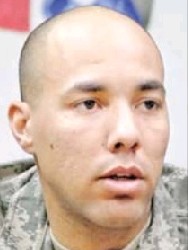

Synopsis:
The President of the United States of America, authorized by Act of Congress July 9, 1918 (amended by an act of July 25, 1963), takes pleasure in presenting the Silver Star to Sergeant First Class Leon J. Richardson, United States Army, for conspicuous gallantry and intrepidity in connection with military operations against an armed hostile force while serving with Company A, 1st Battalion, 6th Infantry Regiment, 1st Brigade Combat Team, 1st Armored Division, in support of Operation IRAQI FREEDOM in Iraq on 28 November 2006. Sergeant First Class Richardson's gallant actions and dedicated devotion to duty, without regard for his own life, were in keeping with the highest traditions of military service and reflect great credit upon himself, the 1st Armored Division, and the United States Army.
Home Town: Burbank, California
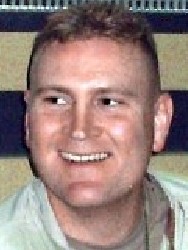

Synopsis:
The President of the United States of America, authorized by Act of Congress July 9, 1918 (amended by an act of July 25, 1963), takes pride in presenting the Silver Star (Posthumously) to Sergeant Kenneth Levi Ridgley, United States Army, for conspicuous gallantry and intrepidity in connection with military operations against an armed hostile force while serving as a Squad Leader in Company A, 3d Battalion, 21st Infantry Regiment, 1st Brigade, 25th Infantry Division, in support of Operation IRAQI FREEDOM in Iraq, on 30 March 2005. Sergeant Ridgley's gallant actions and dedicated devotion to duty, at the cost of his own life, were in keeping with the highest traditions of military service and reflect great credit upon himself, the 25th Infantry Division, and the United States Army.
Home Town: Olney, Illinois


Synopsis:
The President of the United States takes pleasure in presenting the Silver Star Medal to Tommy Rieman, Sergeant, U.S. Army, for conspicuous gallantry and intrepidity in action while serving with Company B, 3d Battalion, 504th Parachute Infantry Regiment, 82d Airborne Division, during combat operations in support of Operation IRAQI FREEDOM, on 3 December 2003, in Iraq. On that date, Sergeant Rieman and his team were sent on a reconnaissance mission near the Abu Ghraib prison in Iraq. Before reaching its destination, the three-vehicle convoy came under heavy enemy fire. Sergeant Rieman moved into position, using his own body to protect his gunner and began returning fire. The Humvees they were traveling in did not have doors, so Sergeant Rieman was directly exposed to the enemy fire. He suffered two bullet wounds and 11 shrapnel wounds. After refusing medical help several times, Sergeant Rieman took charge and moved the convoy off the main road, out of the line of fire, but encountered a smaller group of insurgents. He directed his men to return fire and eventually they suppressed the attack. Sergeant Rieman then set up a defensive perimeter so that a medical evacuation team could extract the wounded.
Home Town: Ohio


Synopsis:
The President of the United States takes pleasure in presenting the Silver Star Medal to Ron Riling, Command Sergeant Major, U.S. Army, for conspicuous gallantry and intrepidity in action while serving as Command Sergeant Major for the 1st Brigade, 1st Infantry Division, during combat operations in support of Operation IRAQI FREEDOM, near Rammadi, Iraq, on 6 April 2003. On that date Command Sergeant Major Riling and his brigade commander were notified that Marines attached to their brigade were pinned down by enemy fire. He quickly organized his forces and began moving to the embattled Marines. When his own elements entered the main town of Rammadi, they immediately came under direct fire coming from every direction. The Marine squad had been pinned down by snipers and was in desperate circumstances when Command Sergeant Major Riling's physical-security detachment arrived on the scene. The squad leader was dead, lying in the middle of the street, and three of the seven Marines were seriously wounded. The senior remaining Marine was a corporal. Command Sergeant Major Riling's force fought its way through withering enemy fire and linked up with the Marines where they were absorbed into the team and fought their way out together. After Command Sergeant Major Riling's team evacuated the injured Marines and recovered a Marine squad leader's body, another Marine platoon in the area came under attack by insurgents armed with rocket-propelled grenades. Command Sergeant Major Riling directed two Bradley Fighting Vehicles from the brigade's reserve into the fight to squelch the attacks.


Citation:
The President of the United States takes pleasure in presenting the Silver Star Medal to Dirk Dale Ringgenberg, Captain (Infantry), U.S. Army, for gallantry in action on 21 June 2005, against an armed enemy in the Mieneshin District of Afghanistan, during combat operations in support of Operation ENDURING FREEDOM. Captain Ringgenberg distinguished himself as the Company Commander, Chosen Company, 2d Battalion (Airborne), 503d Infantry Regiment, while engaging anti- coalition forces near Chalbar Village. When one of his platoons first received contact, he repositioned his command element directly in the middle of the firefight in order to better control his kinetic effects. Under constant direct fire throughout the rest of the engagement, Captain Ringgenberg distinguished himself throughout the seven-hour battle by attacking the enemy and refusing to allow them to break contact, in spite of friendly casualties and an enemy that significantly outnumbered his forces. His adept decision-making and tactical flexibility under heavy rocket-propelled grenade and automatic weapons fire resulted in 76 enemies dead and only six friendly wounded, destroying the Taliban leadership that had terrorized the local populace for months. His leadership was the decisive point to his company's overwhelming success that day. Captain Ringgenberg's heroic actions are in keeping with the finest traditions of the military service and reflect great credit upon himself, the Combined Forces Command- Afghanistan, and the United States Army.
Home Town: Madrid, Iowa


Synopsis:
The President of the United States takes pleasure in presenting the Silver Star Medal to Matthew Ritenour, Staff Sergeant, U.S. Army, for conspicuous gallantry and intrepidity in action against the enemy while serving the 2d Platoon, Company A, 1st Battalion, 4th Infantry Regiment, during combat operations in support of Operation ENDURING FREEDOM, on 4 September 2007, in Afghanistan. On that date Staff Sergeant Ritenour and his unit fought against 180 Taliban fighters who attacked Forward Operating Base (FOB) BAYLOUGH, in southern Afghanistan. Although he was shot in the head and partially paralyzed during the battle, Staff Sergeant Ritenour fought on, encouraging nearby soldiers and using a radio to call in mortar fire on the enemy.
Born: at Chicago, Illinois
Home Town: Chicago, Illinois
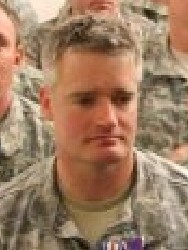

Citation:
The President of the United States of America, authorized by Act of Congress July 9, 1918 (amended by an act of July 25, 1963), takes pleasure in presenting the Silver Star to Master Sergeant Charles P. Ritter, United States Army, for conspicuous gallantry and intrepidity in connection with military operations against the enemy on 30 May 2013, as Operations Sergeant, Operational Detachment-Alpha 3335, Special Operations Task Force-East, Bagram Airfield, Afghanistan in support of Operation ENDURING FREEDOM. Sergeant Ritter distinguished himself by leading a small ambush patrol through restrictive terrain towards a hardened enemy. After being ambushed by the enemy and with one Afghan Commando wounded and pinned in the kill zone, Sergeant Ritter organized, inspired, and led a rescue effort into the enemy fire down a narrow alley to rescue the wounded commando. Sergeant Ritter was wounded three times before the element could successfully reach the trapped commando and bring him to safety. His actions are in keeping with the finest traditions of military heroism and reflect distinct credit upon himself, The Combined Joint Special Operations Task Force-Afghanistan, the Special Operations Joint Task Force-Afghanistan, the United States Forces Afghanistan, and the United States Army. NARRATIVE TO ACCOMPANY AWARD: Master Sergeant Charles P. Ritter, United States Army, heroically distinguished himself by exceptionally valorous conduct in the face of the enemy of the United States as Operations Sergeant, Operational Detachment-Alpha (ODA) 3335, Special Operations Task Force-East, Bagram Airfield, Afghanistan, Combined Joint Special Operations Task Force-Afghanistan in support of Operation ENDURING FREEDOM. On 30 May 2013, Master Sergeant Ritter was a mentor to 2nd Company, 6th Special Operations Kandak, during combat operations in Tagab District, Kapisa Province, Afghanistan. Early morning on 30 May, the Assault Force received heavy and accurate enemy fire from a machineguns, small arms, Rocket Propelled Grenades (RPG), and hand grenades from an aggressive enemy force from distances within 50 meters of friendly positions. After several hours of intense fighting, Sergeant Ritter led a small force of eight Commandos and two Americans on a local patrol to emplace an ambush to interdict enemy fighters maneuvering on the main force. While moving into position the patrol was notified of an enemy ambush set to the south of their location. With this knowledge, Sergeant Ritter decided to maneuver to flank and eliminate the enemy before they could initiate their attack. After moving 25 meters down a narrow alley Sergeant Ritter's patrol was engaged with accurate machinegun fire. The initial burst of fire wounded a Commando and pushed the rest of the force back to a covered position leaving the wounded Commando isolated in the kill zone. Sergeant Ritter immediately communicated his situation to higher in order to receive air-to-ground fires on the enemy position and allow the patrol to move and recover the wounded Commando. However, the aircraft's weapons suffered a malfunction and the fire never came. Sergeant Ritter attempted several times to move down the alley to the casualty but was repelled by intense accurate volleys of machinegun and small arms fire each time. The enemy began to maneuver through orchards directly west of the force eventually engaging the main force with small arms fire. At this point Sergeant Ritter made the conscious decision with complete disregard for his own safety, to move to recover the casualty as he could no longer be seen from Sergeant Ritter's position. Sergeant Ritter organized the Commandos into a rescue effort and began moving towards the casualty while laying down a base of fire to cover their movement. Once movement began, the enemy returned with a high volume of accurate fire but was suppressed by Sergeant Ritter's rescue element. During movement Sergeant Ritter was wounded three times by enemy fire, the most severe injury was a bullet that remained lodged in his back. Sergeant Ritter then moved 40 meters back to cover so the Detachment Medic could render aid. While moving back to cover, the supporting effort successfully rescued the wounded Commando and moved him to safety. At that time an A-10 moved into position to destroy enemy positions. Had Sergeant Ritter not organized, inspired, and led the rescue effort the Commando would have been taken captive or eliminated by the enemy. After receiving treatment, Sergeant Ritter moved on foot with the medic back to the Main Assault force over 125 meters away, all the while pulling security and leading Commandos. His actions are in keeping with the finest traditions of military heroism and reflect distinct credit upon himself, the Combined Joint Special Operations Task Force-Afghanistan, the Special Operations Joint Task Force-Afghanistan, the United States Forces-Afghanistan, and the United States Army.


Citation:
The President of the United States takes pleasure in presenting the Silver Star Medal to Jose M. Rivas, Sergeant, U.S. Army, for conspicuous gallantry and intrepidity in action while serving as a Platoon Medic for 2d Platoon, Combat Company, 1st Battalion, 32d Infantry Regiment, 10th Mountain Division, TASK FORCE CHOSIN, during combat operations in support of Operation ENDURING FREEDOM, on 22 April 2007, near Shudergay Village, Afghanistan. Sergeant Rivas' courage and dedication to duty were paramount as he ran into a hail of enemy gunfire in order to save the lives of his fallen comrades. Sergeant Rivas' actions are in keeping with the finest traditions of military service and reflect great credit upon himself, the Chosin Battalion, the Spartan Brigade, Combined Joint Task Force, the Unites States Central Command, and the United States Army.
NARRATIVE TO ACCOMPANY AWARD:
Sergeant Jose M. Rivas distinguished himself by conspicuous gallantry and intrepidity in action while serving with Combat Company, 1st Battalion, 32d Infantry Regiment, 10th Mountain Division, in support of Operation ENDURING FREEDOM, on 22 April 2007, near Shudergay Village, Afghanistan. On the morning of 22 April 2007, 2nd Platoon Combat Company was conducting a cordon and search of Shudergay Village when the platoon became engaged by 30-40 enemy personnel from 15-20 enemy positions using AK-47s, sniper rifles, PKMs, RPKs, and RPGs lasting approximately 17 hours. After receiving small arms fire from two enemy OPs the platoon was able to clear the village. Once the village was clear one enemy sniper began to engage the patrol base, hitting one ANA Soldier in the pelvic area. Sergeant Rivas, the Platoon Medic, immediately moved the casualty into a room in a home in the village and began working on the patient while under intense enemy fire. The enemy sniper continued to place rounds inside the room Sergeant Rivas had chosen for his CCP. Sergeant Rivas continued to treat the casualty, regardless of the fact that sniper rounds were ricocheting around the room. Due to the intense sniper fire, Sergeant Rivas was not able to relocate the casualty to a safer area. Sergeant Rivas cleared a bed area and immediately opened his aid bag and began working on the casualty, calling out the casualties status and vitals to the Platoon Sergeant for the l0-Line MEDEVAC request. Sergeant Rivas triaged the casualty as "urgent surgical". Once he stabilized the casualty he organized an ANA litter team to move the casualty over 300 meters of rocky, uneven terrain to reach the LZ. En route to the LZ Sergeant Rivas's CASEVAC team became engaged by four enemy positions. The enemy placed heavy accurate direct fire on the CASEVAC element, pinning them down for over an hour and a half. With total disregard for his own safety, Sergeant Rivas continued to treat the casualty amidst heavy enemy fire. As the ANA Soldier's blood pressure began to drop, Sergeant Rivas quickly administered two more IV's to stabilize the casualty, the entire time using his own body to shield the casualty from the heavy enemy contact. While treating the ANA soldier, Sergeant Rivas found out that the Platoon Sergeant had fractured his ankle during the engagement. Sergeant Rivas finished stabilizing the ANA casualty, and then he moved back 40 meters through intense enemy fire in order to assess the Platoon Sergeant. H e accurately assessed that it was a severe sprain, not a break, but the Platoon Sergeant would be unable to walk on the ankle. Sergeant Rivas then had another Soldier assist him in putting the leg in a splint. He took charge of the nearest group of Soldiers and assigned a two man litter team to assist the Platoon Sergeant the rest of the way to the LZ. Sergeant Rivas then moved back through the 40 meter partially open area to continue treating the ANA Soldier, crawling on his hands and knees to avoid the enemy small arms fire that was impacting around him. He once again assessed his casualty and passed up both causalities' information so that the MEDEVAC helicopter would have updated information on the patients. Sergeant Rivas exemplifies what it means to be a Combat Medic. Sergeant Rivas had only been with the platoon for less than a week and was on his first mission when he showed extreme courage under intense enemy small arms fire and total disregard for his own personal safety during the 17 hour fight. His valorous actions under intense enemy fire showcase his personal courage, dedication to duty and commitment to his men and his ANA Soldiers.
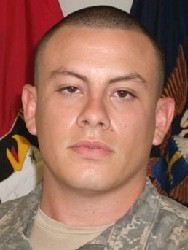

Synopsis:
The President of the United States of America, authorized by Act of Congress July 9, 1918 (amended by an act of July 25, 1963), takes pride in presenting the Silver Star (Posthumously) to Staff Sergeant Juan L Rivadeneira, United States Army, for conspicuous gallantry and intrepidity in connection with military operations against an armed hostile force while serving with Company B, 2d Battalion, 502d Infantry Regiment, 101st Airborne Division, in support of Operation ENDURING FREEDOM in Afghanistan, on 13 November 2010. Staff Sergeant Rivadeneira distinguished himself through selfless sacrifice and steadfast dedication to his Soldiers when a suicide bomber attacked his position. Staff Sergeant Rivadeneira's quick response to the imminent threat and disregard for his own life saved the lives of his entire squad. His gallant actions and dedicated devotion to duty, without regard for his own life, were in keeping with the highest traditions of military service and reflect great credit upon himself, his unit, and the United States Army.
ROBBINS, DAVID A.
Synopsis:
The President of the United States of America, authorized by Act of Congress July 9, 1918 (amended by an act of July 25, 1963), takes pleasure in presenting the Silver Star to Master Sergeant David A. Robbins, United States Army, for conspicuous gallantry and intrepidity in action against the enemy in support of Operation ENDURING FREEDOM in Afghanistan. His gallant actions and dedicated devotion to duty, without regard for his own life, were in keeping with the highest traditions of military service and reflect great credit upon himself, his unit, and the United States Army.
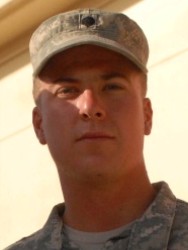

Synopsis:
The President of the United States of America, authorized by Act of Congress July 9, 1918 (amended by an act of July 25, 1963), takes pleasure in presenting the Silver Star to Specialist [then Private First Class] Nicholas G. Robinson, United States Army, for conspicuous gallantry and intrepidity in action against the enemy on 24 May 2010 while serving with Company D, 1st Battalion, 187th Infantry Regiment, 3d Brigade Combat Team, 101st Airborne Division, in support of Operation ENDURING FREEDOM in Afghanistan. Specialist Robinson was working on a guard shift at the 5th Afghan Border Police compound near Combat Outpost Zerok when it came under a mortar attack. One enemy round landed 20 meters in front of the guard tower, knocking him down, and when he got back up gunfire was erupting from all around him. Specialist Robinson grabbed a machine gun, fired, and killed an insurgent who was carrying a rocket propelled grenade launcher. As the fight went on, 15 more insurgents advanced on him. He expended all of his ammunition, then grabbed an AK-47 from a nearby border policeman and continued to fire on the enemy. In the brief firefight, Specialist Robinson was able to fend off an attack by 15 to 20 enemy insurgents. His gallant actions and dedicated devotion to duty, without regard for his own life, were in keeping with the highest traditions of military service and reflect great credit upon himself, the 101st Airborne Division, and the United States Army.
Home Town: Gig Harbor, Washington
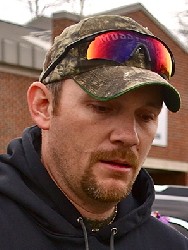

Synopsis:
The President of the United States of America, authorized by Act of Congress July 9, 1918 (amended by an act of July 25, 1963), takes pleasure in presenting the Silver Star to Sergeant First Class Del Rodriguez, III, United States Army, for conspicuous gallantry and intrepidity in connection with military operations against the enemy while serving with Company A, 4th Battalion, 31st Infantry Regiment, 10th Mountain Division, in support of Operation IRAQI FREEDOM in Iraq, from 16 October 2006 to 3 February 2007. On that date, Sergeant First Class Rodriguez and about 28 soldiers had taken up positions on a rooftop in a village when they were pinned down by withering enemy fire coming from three directions. As his comrades returned fire, Sergeant First Class Rodriguez crawled to the edge to locate the house from which they were taking the heaviest fire and then called in an Apache helicopter for close air support. The subsequent helicopter attack destroyed the building and the enemy fire ceased. Sergeant First Class Rodriguez's gallant actions and dedicated devotion to duty, without regard for his own life, were in keeping with the highest traditions of military service and reflect great credit upon himself, the 10th Mountain Division, and the United States Army.
RODRIGUEZ, JOSE R.
Synopsis:
The President of the United States takes pleasure in presenting the Silver Star Medal to Jose R. Rodriguez, Sergeant First Class, U.S. Army, for conspicuous gallantry and intrepidity in action while serving as a Platoon Sergeant with Company B, 3d Battalion, 69th Armor, 3d Brigade Combat Team, 3d Infantry Division, during combat operations in support of Operation IRAQI FREEDOM, on 19 March 2007, in Iraq. On that date, Sergeant First Class Rodriguez rushed out of Forward Operating Base Hawas in a Bradley vehicle to help two of his platoon's Bradley vehicles that were on overwatch duty. They were attacked by an unknown number of insurgents who pinned them down with rocket-propelled grenades and small-arms fire. When he got there, he heard the gunfire, but he couldn't lay eyes on his two Bradleys and didn't want to lay down suppressive fire until he could figure out where they were. Sergeant First Class Rodriguez began looking down a series of alleys perpendicular to a main road. Turning down one of them, his driver struck a roadway bomb. The driver of the Bradley Sergeant First Class Rodriguez was looking for couldn't back up, either, because there was another roadway bomb. Pinned down, Sergeant First Class Rodriguez called for more help, and his tactical operations center dispatched two more Bradleys and a recovery vehicle for his own Bradley. While his driver was on the radio Sergeant First Class Rodriguez realized the front of his Bradley was on fire and the driver's compartment was filling with smoke and he crawled in through the space between the gunner's position and the driver's compartment and pulled him out by the handle on the back of his vest. The gunner was still engaging the enemy with his main gun and the two Bradleys on the main road were still taking and returning fire. More improvised explosive devices were being tossed everywhere making it harder and harder to move around. After pulling his driver to safety into the back of the Bradley, Sergeant First Class Rodriguez got out to help the recovery vehicle operator hook up the towing chains and saw a number of insurgents approaching their position. He raised the muzzle of his rifle and shot and killed eight of them.


Citation:
The President of the United States takes pleasure in presenting the Silver Star Medal to Peter David Rohrs, Staff Sergeant, U.S. Army, for conspicuous gallantry and intrepidity in action against the enemy while serving as a Flight Medic with Company C, 3d Battalion, 82d Combat Aviation Brigade, 82d Airborne Division, during combat operations in support of Operation ENDURING FREEDOM VIII, on 9 November 2007, in Afghanistan. Staff Sergeant Rohrs' selfless actions are directly responsible for the rescue of twelve critically wounded coalition soldiers. Staff Sergeant Rohrs' courage, tactical abilities, and regard for the safety of his patients, crew and aircraft are nothing less than remarkable. His exceptional bravery and personal gallantry has set the example for the 82d Airborne Division, and is in keeping with the highest tradition of military service.
Home Town: Fayetteville, North Carolina
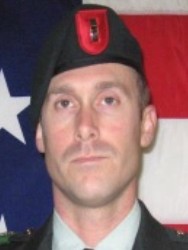

Citation:
The President of the United States of America, authorized by Act of Congress July 9, 1918 (amended by an act of July 25, 1963), takes pleasure in presenting the Silver Star to Sergeant First Class Mark J. Roland, United States Army, for exceptionally valorous action while serving as the Intelligence Sergeant for Special Forces Operational Detachment Alpha 732, Special Operations Task Force-71, Firebase Ripley, Afghanistan in support of Operation ENDURING FREEDOM on 11 June 2007. Sergeant Roland distinguished himself by inspiring those around him to extraordinary collective valor. His actions in clearing and destroying enemy fighters at close range, rescuing eight afghan soldiers, and leading the actions of the detachment's split team, were essential to an overwhelming battlefield victory. Sergeant Roland's personal courage and commitment to mission accomplishment in a combat zone, under extreme circumstances greatly contributed to mission success. His actions are in keeping with the finest traditions of military heroism and reflect distinct credit upon himself, the Combined Joint Special Operations Task Force-Afghanistan, Special Operations Command Central, and the United States Army. NARRATIVE TO ACCOMPANY AWARD: Sergeant First Class Mark J. Roland, United States Army, heroically distinguished himself by exceptionally valorous conduct in the face of the enemy as the Intelligence Sergeant for Special Forces Operational Detachment Alpha (SFODA) 732, Special Operations Task Force-71, Firebase Ripley, Afghanistan in support of Operation ENDURING FREEDOM. On 11 June 2007, Sergeant Roland willingly and without regard for his own life, cleared an enemy trench line and rescued eight Afghan Soldiers. SFODA 732 came to the aid of Afghan Forces in a near ambush and became enveloped in the same ambush composed of a numerically superior enemy force. The enemy immediately engaged them with small arms, machine guns, rocket propelled grenades, and recoilless rifle fire from distances as close as three meters. Sergeant Roland led his split team and moved to establish a support by fire position next to a north-south running wadi, while the other split team bounded to the east to flank the enemy ambush positions. Not knowing the enemy had established a fighting position in the wadi next to where his vehicle stopped, his element was engaged by fire from three meters away, striking the driver's side window, turret armor, and his gunner in the chest plate of his body armor. Recognizing the crew served weapons could not engage the enemy at that angle, Sergeant Roland, without regard for his own life, took action to defeat the threat. He dismounted, prepared and threw a fragmentary grenade into the wadi. Sergeant Roland then entered the trench immediately confronting an enemy at close range. Without hesitation, he killed one fighter, cleared his body of weapons and equipment, and continued to fight. Running low on ammunition, Sergeant Roland reloaded his primary weapon, when a second enemy fighter approached from the southern portion of the wadi. Sergeant Roland's teammate, who covered him when he changed magazines engaged and destroyed the approaching enemy from high ground. Together, Sergeant Roland and his teammate cleared north through the intersecting wadi positions and the deep wells within them, ensuring that no more enemy fighters remained in a position where they could threaten either split team. During this movement north through the wadi, enemy snipers continually engaged Sergeant Roland and his teammate. Despite this fire, Sergeant Roland and his teammate continued to clear the wadi until they were sure that no more enemy remained in a position that could threaten the detachment's rear flank. Sergeant Roland and his teammate then returned to their vehicle where they rejoined the on-going fight above ground. At this point, Sergeant Roland identified eight Afghan Soldiers who were pinned down in the ambush kill zone by enemy machine gun fire. Recognizing the danger, Sergeant Roland without orders, again risked his life and mounted a rescue effort for the eight Afghan Soldiers. Moving his vehicle into a position where his gunner could provide covering fire, Sergeant Roland dismounted and moved through the enemy fire to the position of the pinned down Soldiers. Exposed to enemy fire and delayed by an inability to communicate with those who were pinned down, Sergeant Roland moved four of the Soldiers back to his vehicle, while directing the remaining four to another detachment vehicle. From this point, all eight Soldiers moved back to friendly positions behind the cover of the detachment's vehicles. Over the course of several more hours, Sergeant Roland and his teammates continued to identify and engage enemy forces with machine gun and small arms fire as coalition close air support destroyed targets along the ambush line. As a result of his exceptional bravery in voluntarily rescuing eight Afghan Soldiers, destroying enemy fighters at close range, and leading the actions of a split detachment, Sergeant Roland inspired those around him by his poise, confidence, and absolute willingness to risk his life to accomplish the mission and turn the momentum of the fight. The valorous actions of Sergeant Roland are in keeping with the finest traditions of military heroism and reflect distinct credit upon himself, the Combined Joint Special Operations Task Force-Afghanistan, Special Operations Command Central, and the United States Army.
Home Town: State College, Pennsylvania
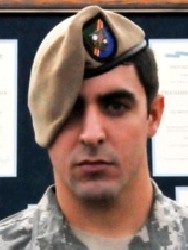

Citation:
The President of the United States of America, authorized by Act of Congress July 9, 1918 (amended by an act of July 25, 1963), takes pleasure in presenting the Silver Star to Sergeant Michael A. Ross, United States Army, for conspicuous gallantry and intrepidity in action on 13 April 2012 during combat operations against an armed enemy of the United States as a First Platoon Sniper Team Leader for a Joint Task Force in support of Operation Enduring Freedom. Sergeant Ross selflessly and with no regard for his own personal safety, prevented further injury to an already wounded Ranger by placing himself over the body of a wounded teammate inside of effective enemy fire from superior positions. Sergeant Ross, still under fire, moved a fellow Ranger to the only cover available and remained in an exposed position over his body while returning fire and waiting for support from his fellow Rangers. Sergeant Ross distinctive accomplishments are in keeping with the finest traditions of military service and reflect great credit upon himself, this Command, and the United States Army. NARRATIVE TO ACCOMPANY AWARD: Sergeant Michael A. Ross, United States Army distinguished himself by exceptionally heroic gallantry on 13 April 2012 as a 1st Platoon Sniper Team Leader assigned to Delta Company while deployed to Afghanistan in support of Operation ENDURING FREEDOM. Sergeant Michael Ross' bravery and gallantry during combat operations in eastern Afghanistan single-handedly prevented further injury to Sergeant Tanner Higgins at dire risk to his own life. Immediately after Sergeant Higgins was wounded and under an enormous amount of direct fire, Sergeant Ross quickly grabbed Sergeant Higgins' SCAR to better suppress the enemy fighters engaging his completely exposed position. As Sergeant Ross suppressed multiple enemy fighting positions, numerous bursts of automatic enemy fire impacted all around him and Sergeant Higgins; approximately one dozen rounds impacted only inches from their bodies. After gaining fire superiority and forcing the enemy on the rooftop to retreat, Sergeant Ross immediately maneuvered Sergeant Higgins to the only cover available on the rooftop and once again established himself in a completely exposed position over Sergeant Higgins. While Sergeant Ross continued to suppress enemy positions within the compound, he began to direct the assault force to enemy positions within the compound and his own location. Sergeant Ross continued to suppress barricaded enemy fighters in vastly superior positions to his own for five minutes while the assault force attempted to conduct a rooftop extraction. Once other Rangers gained access to the rooftop, he then knowingly exposed himself to enemy positions again in order to help SSG Bartels move Sergeant Higgins off of the roof. Once outside of the compound, Sergeant Ross immediately moved to the breach to assist the assault force in identifying enemy positions and suppressing the target compound. During clearance operations, Sergeant Ross provided over-watch for a squad of Afghan troops as they cleared the target compound. During the clearance, an enemy fighter exposed himself within the target compound where the Afghan squad could not observe him. Sergeant Ross immediately eliminated the fighter with one round and prevented any Afghan casualties. Following the clearance of the target compound, Sergeant Ross immediately moved himself and another sniper external to the compound in order to provide over-watch for the assault force. Sergeant Ross continually scanned the area with another sniper and ensured no other enemy personnel attempted to maneuver on the assault force. Sergeant Ross' bravery and courage to sprint through superior and effective enemy fire to aid Sergeant Higgins undoubtedly prevented a wounded Ranger from receiving additional injuries. Sergeant Ross knowingly and without hesitation moved from a defensible position into an enemy kill zone without cover in order to protect a wounded teammate with his own body and with only his direct fires as their defense. His actions reflect great credit upon himself, this command, and the United States Army.
Home Town: Liverpool, New York


Citation:
The President of the United States takes pleasure in presenting the Silver Star Medal to Cliff Roundtree, Sergeant First Class, U.S. Army, for gallantry in action against enemy forces from 7 August 2005 to 9 August 2005, while assigned as an Operational Detachment Alpha 316 (ODA-316) Weapons Sergeant with the 1st Battalion, 3d Special Forces Group (Airborne), Combined Joint Task Force 76, during Operation ENDURING FREEDOM in Afghanistan. Sergeant First Class Roundtree distinguished himself in seven fierce engagements during a time span of fifty-six hours, while engaging enemy positions with machine gun fire from the turret of his vehicle. His dedication to duty, tactical proficiency, and commitment to mission accomplishment under the most extreme circumstances greatly contributed to accurate fires on enemy forces and to the mission's success. Sergeant First Class Roundtree's valorous performance in a combat zone is in keeping with the finest traditions of military service and reflects great credit upon himself, the Combined Joint Task Force 76, and the United States Army.
NARRATIVE TO ACCOMPANY AWARD:
Sergeant First Class Cliff Roundtree distinguished himself by exemplifying spirited bravery as the Weapons Sergeant for Operational Detachment Alpha 316 (ODA-316), 1st Battalion, 3d Special Forces Group (Airborne), Combined Joint Special Operations Task Force-Afghanistan in support of Operation ENDURING FREEDOM from 7 August to 9 August 2005. Sergeant First Class Roundtree distinguished himself in seven fierce enemy engagements with a well trained, tactically emplaced, and aggressive enemy firing a time span of fifty-six hours while operating as the M240B Machine gunner on the first vehicle of our element, while conducting operations in the Zabol Province of Afghanistan while deployed to A-Camp Lane. Sergeant First Class Roundtree's calmness under fire and tactical competence were imperative to the detachment's survival. During the unit's first engagement in the Buka Ghar Valley, Sergeant First Class Roundtree was instrumental in helping fix and engage enemy positions that had the entire element pinned down. His continuous engagement without concern for his own well being allowed heavily suppressed elements to get to positions of better cover and his relentless punishment of the enemy while fully exposed later caused them to retreat. During the second contact in Buka Ghar Valley, Sergeant First Class Roundtree once again was instrumental in accurately putting down heavy volumes of fire on well emplaced machine gun positions so other members of his gun vehicle could move up to pinned down Afghanistan National Army (ANA) elements that were part of the patrol, helping to consolidate, assess, and gain control of the situation. His unit continued to receive heavy volumes of machine gun fire and RPGs from numerous positions. He played a crucial role in the final elimination and forced withdrawal of the enemy by providing cover for the ODA's mortar team while they engaged the extremely fortified machine gun positions. If it wasn't for the cover fire and marking of these positions by Sergeant First Class Roundtree, the element would have been seriously devastated by the well-emplaced, heavily armed and numerically superior forces. The element continued to pursue the enemy during their retreat when they sent ahead for reinforcements to set up what was to be the third ambush. Upon the third Anti Coalition Member (ACM) ambush, Sergeant First Class Roundtree immediately located and fired upon the well emplaced and trained enemy force without care for his own life while being engaged himself by a flanking element. His bravery allowed the ANA element to maneuver on the larger ACM element, later causing the enemy to maneuver to a location they thought would give them a tactical advantage. This only led them to a better vantage point for Sergeant First Class Roundtree, who was able to eliminate them during their maneuver to what would have been a position devastating to the ANA element. The remaining ACM elements broke contact again, only to reform and gather more experience and trained fighters further down our route. The fourth ACM contact opened up on the lead element with concentrated fire, but Sergeant First Class Roundtree's close proximity allowed him to quickly and effectively respond, as he had done in the previous contacts, knowing that he would draw fire upon himself. Immediately to the rear flank of his vehicle, the major portion of the ambush opened up with an extraordinary amount of heavy machine gun fire. Sergeant First Class Roundtree, while fully exposed, quickly and effectively spun his turret and machine gun in the direction of the greater fire and began to engage. The whole time rounds were impacting all around his vehicle and him. He continued to engage without care for his own welfare or safety, his only care being that of his fellow team members. He continued to suppress the well-concealed enemy until aircraft came on station. Sergeant First Class Roundtree was able to spot and lay down effective fire so the aircraft knew where to fire to completely eliminate the enemy threat. The ODA intercepted ACM communications that again said they were reorganizing at a location that they had success within the past. Sergeant First Class Roundtree demanded that the ODA continue on and finish the enemy. As the ODA entered the Cakyan Ghar Valley, the ACM element opened up on the lead element as before with extraordinary volumes of machine gun, RPG, and AK-47 fire. Sergeant First Class Roundtree immediately pinpointed and engaged this highly trained, numerically superior, and well-equipped ACM force that the ODA had been dealing with and pursuing for the past thirty hours. Sergeant First Class Roundtree continued to engage without care for his own life. His only concerns were for the care of his fellow team mates and trying to eliminate, or draw some of the fire from those machine gun positions that had the lead element pinned down. No sooner had Sergeant First Class Roundtree begun to engage the well- emplaced enemy positions, when the rest of the ACM ambush opened up with an enormous amount of fire on the entire element. Within minutes, SFC Roundtree's turret burst into flames caused by incoming rounds. SFC Roundtree continued to engage without care for his own welfare or safety, engaging the fierce enemy with pinpoint accuracy until his driver pulled him down from his gun position because of the intense fire that raged around SFC Roundtree. The following morning the element began its final pursuit of the ACM forces in the Marah Valley. The element didn't get thirty minutes down the route when the highly trained enemy force engaged, once again. SFC Roundtree quickly fixed the enemy positions and engaged them with pinpoint accuracy allowing the second and third vehicle to pick up and engage in the same fashion. This was instrumental in the element being able to clear the switchback pass and make link up with the ground quick reaction force (QRF). Within minutes of link up and movement with the QRF element, the ODA made the seventh contact with what would turn out to be the largest, most violent ACM force of all the contacts that the ODA had faced in the prior fifty-six hours. SFC Roundtree quickly fixed and began to lay down heavy volumes of fire on the ACM element that opened up on the lead element and his vehicle with extraordinary volumes of machine gun, RPG, and AK-47 fire. SFC Roundtree's vehicle was struck numerous times and yet again he continued to fiercely lay down fire so the rest of his element could clear the choke point at which the enemy was engaging with tremendous amounts of fire. His continuous engagement without concern for his own well being allowed the heavily suppressed elements to get to positions of better cover and his relentless punishment to the enemy while fully exposed later caused them to retreat. SFC Roundtree willfully and voluntarily chose to serve in Operation ENDURING FREEDOM supporting his fellow soldiers, the legitimate Government of Afghanistan, and the United States of America in the global war on terror. The distinctive accomplishments of Sergeant First Class Roundtree reflect great credit upon himself, the Combined Joint Special Forces Operations Task Force-Afghanistan and the United States Army.
Born: at Alaska
Home Town: Alaska
Personal Awards: Silver Star (War on Terrorism), Bronze Star w/V, Army Commendation Medal


Synopsis:
The President of the United States takes pleasure in presenting the Silver Star Medal to Frederick L. Rowell, Staff Sergeant, U.S. Army, for conspicuous gallantry and intrepidity in action while serving with the 1st Battalion (Airborne), 509th Infantry Regiment, during combat operations in support of Operation IRAQI FREEDOM, on 4 April 2003, in Iraq. Staff Sergeant Rowell displayed extraordinary heroism and gallantry when his team came under enemy fire in Iraq. Taking small arms and rocket-propelled grenade fire, Staff Sergeant Rowell led his team back to their Bradley Fighting Vehicle during the battle for Baghdad International Airport. After accounting for his men, Staff Sergeant Rowell observed fellow Soldiers of Bravo Team, 1st Squad, who were pinned down in an exposed position, under heavy enemy fire with no leadership. Staff Sergeant Rowell jumped from his Bradley Fighting Vehicle, ran across open terrain under heavy fire to provide leadership for the exposed Soldiers. Upon his arrival, Staff Sergeant Rowell noted that one Soldier had been shot through both legs. He organized Bravo Team and began suppressing fire, applied first aid to the Soldier's legs and called for an evacuation. Staff Sergeant Rowell became aware that enemy fire was landing around the injured Soldier and used his own body to shield the casualty from further injury. While providing cover, Staff Sergeant Rowell was struck in the middle back of his Interceptor Ballistic Vest by a 7.63-mm round. Staff Sergeant Rowell continued to provide cover and direction to the Bravo Team Soldiers until an evacuation vehicle arrived. The evacuation vehicle was unable to move closer to the team than 100 meters. Staff Sergeant Rowell picked up the injured Soldier and carried him to the vehicle under continued enemy fire. He then remained in an exposed position while the rest of Bravo Team reached the evacuation vehicle. Leaving the evacuation vehicle, Staff Sergeant Rowell again encountered enemy fire as he moved to his Bradley Fighting Vehicle to rejoin members of his rifle team.
ROWLAND, JOHN M.
Citation:
The President of the United States of America, authorized by Act of Congress July 9, 1918 (amended by an act of July 25, 1963), takes pleasure in presenting the Silver Star to Staff Sergeant John M. Rowland, United States Army, for exceptionally valorous achievement from 28 to 29 August 2010, as a Ranger Squad Leader for a joint task force in support of Operation ENDURING FREEDOM. During this period, Staff Sergeant John M. Rowland engaged and eliminated several threats to the assault force including one machine gun while under direct enemy fire at a ranger of five meters with total disregard for his personal safety. His decisive actions fixed the enemy, segregating them from non-combatants on the objective, and allowed the assault force to effectively breach and clear the target compound. Through his distinctive accomplishments, Staff Sergeant Rowland reflected great credit upon himself, this command and the United States Army. NARRATIVE TO ACCOMPANY AWARD: On August 28-29, 2010 while conducting combat operations, Staff Sergeant John M. Rowland distinguished himself by exceptionally valorous actions while serving as a Ranger Squad Leader in support of Operation ENDURING FREEDOM. While the main body of the assault force approached objective A from the west, one enemy combatant exited the target compound from the south side, turned to the west, saw the lead members of the Assault force and quickly returned to the compound, which in turn hastened their movement toward the compound. Staff Sergeant Rowland climbed onto the roof of the southwestern most building of the target compound. Once on the roof, an enemy combatant in the courtyard, who upon observing him returned to another building, saw Staff Sergeant Rowland. Shortly after the enemy combatant reappeared in the doorway with an AK-47 assault rifle; Staff Sergeant Rowland engaged and killed him. This action drew the fire of three additional enemy personnel from the south side door and windows of the second building. One of the enemy fighters armed with a PKM, had his weapon system oriented so the first burst would engage anything entering the compound door. Due to Staff Sergeant Rowland's rapid reaction and engagement of the enemy, the greatest volume of fire was directed at his position instead of the main assault force located at the target compound's southern breach. By this time, another Ranger had joined Staff Sergeant Rowland on top of the first building as the enemy with the PKM continued to engage their position from a distance of approximately five meters with a cyclic rate of fire. Staff Sergeant Rowland was without cover or concealment while he received a heavy amount of small arms fire. He maintained his exposed position and continued to engage threats in and around the second building, killing two and severely wounding the PKM gunner. Staff Sergeant Rowland maintained incredible composure while under intense AK-47 and PKM machine gun fire that would have decimated the assault force. His accurate engagement and destruction of three entrenched fighters enabled the assault force to gain entry into the compound without receiving devastating fire and successfully secure the target compound. Staff Sergeant Rowland's heroic actions saved the lives of his fellow assaulters and numerous women and children on the objective. Staff Sergeant John M. Rowland's tactical proficiency, analytical decision-making skills, and composure under fire undoubtedly saved the lives of the assault force's breach team. His selfless actions drawing the enemy fire away from the breach not only fixed and neutralized the enemy preventing them from integrating with non-combatants on the objective, but allowed the breach team to emplace a charge, gain entry to and clear the targeted compound.
Home Town: Madison, Mississippi
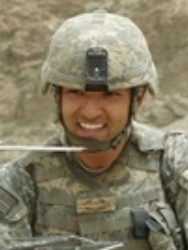

Citation:
The President of the United States of America, authorized by Act of Congress July 9, 1918 (amended by an act of July 25, 1963), takes pleasure in presenting the Silver Star to Specialist Gregory S. Ruske, United States Army (Reserve), for gallantry in action on 21 April 2008, while assigned to the Combined Joint Task Force-101 in support of Operation ENDURING FREEDOM, in Kapisa Province, Afghanistan. In the face of heavy fire from an enemy ambush and without regard for his own safety, Specialist Ruske directed suppressing fire which allowed his unit to gain advantageous cover. Ignoring wounds sustained in battle, he also led rescue efforts for two wounded Soldiers and remained combat effective until his own medical evacuation. Specialist Ruske's gallantry, valor, and outstanding performance of duty are in keeping with the finest traditions of military service and reflect great credit upon himself, the 101st Airborne Division (Air Assault), and the United States Army. NARRATIVE TO ACCOMPANY AWARD: While serving with 3d Platoon, Company A, Task Force GLADIATOR, Combined Joint Task Force-101 (101st Airborne Division), during Operation OVERWATCH in Kapisa Province, Afghanistan, Specialist Gregory S. Ruske distinguished himself and is cited for exceptional gallantry in action by meritorious and valorous action. On 21 April 2008, Specialist Ruske was conducting a dismounted patrol in the village of Afghanya, Kapisa Province, Afghanistan. At 0800 hours his platoon made contact with a numerically superior Anti-Afghan Force (ANTI-AIRCRAFT FIRE). The enemy unleashed a heavy volume of RPG, PKM and AK=47 fire from defilade and elevated positions. With himself and his platoon in an exposed position, Specialist Ruske immediately began to suppress the enemy with accurate rifle and M-203 grenade fire. This allowed his element to begin maneuvering to positions that provided adequate cover. During the initial barrage, two Afghan National Police Officers were wounded in the legs and back. They remained pinned down in the open. Disregarding his personal safety, Specialist Ruske bounded from cover to better engage the enemy and provided covering fire for the two fallen ANP Officers. As Specialist Ruske's platoon maneuvered to a more advantageous position, they were able to reach one fallen ANP Officer. Enemy fire increased drastically, making rescuing the remaining wounded ANP Officer nearly impossible. Seeing this, Specialist Ruske and two fellow Soldiers began maneuvering to a roof top that offered better fields of fire. This served only to embolden the enemy, who quickly shifted fires to Specialist Ruske's position. During this violent exchange of gunfire Specialist Ruske was shot in the left hip with the bullet exiting his lower back. Specialist Ruske received immediate first aid, and without hesitation returned to the fight. Through 30 minutes of sustained battle, the wounded ANP Officer was able to crawl to within 30 meters of Specialist Ruske's position. Under cover of fire from his platoon, Specialist Ruske and a fellow Soldier, again disregarding personal safety and the withering enemy fire, bounded the 30 meters to the ANP Officer and dragged him to cover. Specialist Ruske, in need of immediate medical attention himself, began applying first aid to the ANP Officer and immediately rejoined the fight. Specialist Ruske maintained situational awareness, ignoring his own wounds, stayed in the fight for the next three and a half hours before supporting elements could reach their position and facilitate the much-needed medical evacuation. Specialist Ruske's actions are in keeping with the finest traditions of valor and heroism Soldiers of the United States Army are known for. This reflects great credit on himself, Task Force GLADIATOR, Combined Joint Task Force-101, and the United States Army.
Home Town: Aurora, Colorado
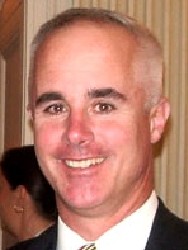

Citation:
The President of the United States of America, authorized by Act of Congress July 9, 1918 (amended by an act of July 25, 1963), takes pleasure in presenting the Silver Star to Lieutenant Colonel Scott E. Rutter, United States Army, for gallantry in action in the course of military operations involving conflict with an armed hostile force in the Republic of Iraq. Lieutenant Colonel Rutter distinguished himself through his exceptionally valorous actions in the early hours of 22 March 2003 as Battalion Commander, 2d Battalion, 7th Infantry Regiment, 2d Brigade Combat Team, 3d Infantry Division, during a hasty attack in the city of As Samwah. After determining the route ahead was, supposedly clear of enemy, was in fact the site of a previous ambush on a friendly force Lieutenant Colonel Rutter, displayed great poise and adaptability by rapidly and skillfully planning a coordinated attack supported by indirect fire and close air support to destroy a known enemy bunker system. The attack was successful in destroying all 6 enemy bunkers and killing 8 enemy soldiers allowing the lead company to establish a foot-hold to continue the attack against the enemy. Enemy dismounted elements immediately ambushed the lead company as it continued to advance. The fight pushed the company deeper into the town during which it became further enmeshed in enemy fire by more than 100 Iraqi Baath party militiamen. Intense enemy rocket propelled grenade fire, air defense artillery systems in direct fire mode, hand grenades, and automatic weapons threatened to stall or stop the attack. With total disregard for his own personal safety, Lieutenant Colonel Rutter moved to the area with the most intense fire in order to maneuver the company and defeat the ambush. Braving numerous rocket propelled grenade and small arms bursts directed at his vehicle he fought forward to destroy the enemy ambush, disengage the lead company and continue to clear the route. Numerous soldiers witnessed him repeatedly place himself in the most vulnerable positions in order to direct the attack. He refused to leave until the enemy was destroyed or broken and he had successfully reoriented the company attack. His extraordinary bravery during his battalion's first contact with enemy forces ensured the rapid advance of not only his own battalion but key follow-on division assets including a field artillery battalion and two patriot air defense batteries. Lieutenant Colonel Rutter's fearless heroism as shown in his disregard for his own life while acting to save his men and ensure mission success set a tone for the battalion that directly contributed to its aggressiveness and demeanor throughout the campaign. His actions are in keeping with the highest traditions of the military service and reflect great credit to himself, the 2nd Battalion 7th Infantry Regiment, and the United States Army.

